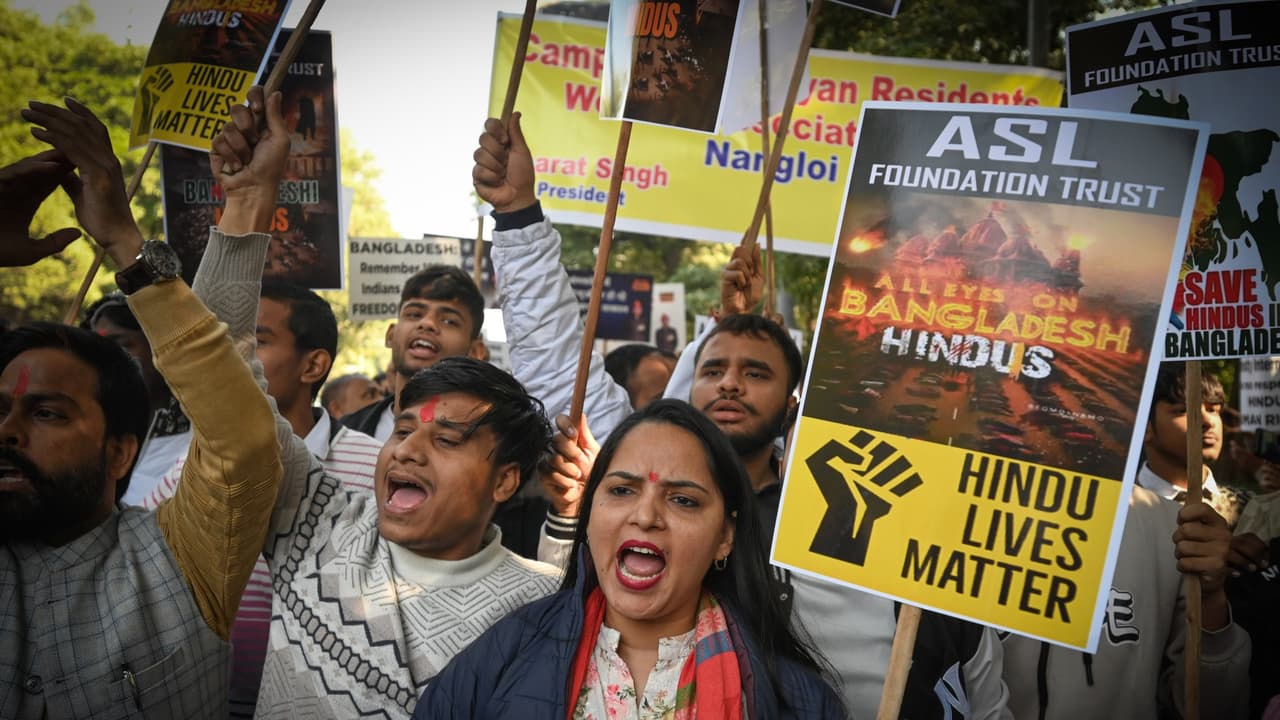After Sheikh Hasina’s ouster in August 2024, minorities in Bangladesh faced brutal attacks. With over 2,400 incidents reported but only a handful prosecuted, a culture of impunity is emboldening perpetrators and silencing victims.
New Delhi: After the Sheikh Hasina government was ousted and she fled her country to come to India on August 5, 2024, the political transition in Bangladesh made one thing clear. It was feared that the minorities would suffer. The minority community leaders at the time, terrified by the political ongoings and targeted crimes against Hindus, said that their homes, businesses, and places of worship came under attack across dozens of districts.
For instance, after Hasina’s exit, the Chakraborty family settled in the Bagerhat district and told an international media organization that armed men attacked their home, injuring family members and killing the patriarch, Mrinal Kanti Chakraborty. His daughter Priyonti said the attackers appeared to be motivated by a land dispute. The family has since abandoned their home. Though they claim the local police have made verbal promises, no case has been filed or investigation begun, leaving the perpetrators unpunished.
The gruesome incident with the Chakraborty family is not a one-off case. Temples were vandalized, shops looted, and families terrified.
Weeks later, many of those accused remained untried; few arrests resulted in real charges, and even fewer in convictions.
In July 2025, reportedly, the Bangladesh Hindu Buddhist Christian Unity Council and the Minority Unity Alliance at a press conference said that 27 individuals were killed in communal attacks between January and June 2025.
They also claimed that 2,442 incidents of communal violence occurred over the past 11 months. The incidents included desecration of religious sites, forced evictions, property damage, and alleged assaults.
The two organizations further claimed that most incidents occurred during two weeks from August 4 to August 20, 2024, reporting 2,010 incidents, including 1,769 attacks and assaults on minorities.
In response to these statistics, the police said they have verified 1,457 of these incidents across 56 districts.
However, of these incidents, the police formally filed only 62 cases and arrested 35 individuals in response. The 951 additional cases were recorded as complaints, but no formal criminal cases had been filed.
As evident from the numbers, the conversion of these complaints into cases is extremely low, with cases leading to legal action accounting for even fewer. According to reports, victims in several districts noticed that their complaints went uninvestigated for months. No substantial follow-ups, weak forensic work, and frequent loss or intimidation of witnesses were reported.
Authorities went on to frame allegations of communal violence as being more “political” rather than sectarian. This tends to shift the burden of proof and dampens the urgency of response. It also negates people’s traumatic experiences due to the violence.
The interim government, led by Chief Adviser Muhammad Yunus, has declared a “zero-tolerance” stance on communal violence and urged swift investigations. However, these proclamations, although frequent, are shallow at best, with little to no follow-through in prosecution, and convictions are weak.
Without formal case numbers or active investigation, accused perpetrators remain free. Minority leaders have said that arrests tend to happen more when the political cost is high, but not necessarily as a consistent pattern of accountability.
Following the initial large-scale coverage of incidents around August 5, several arrests were made; however, many victims in more remote areas received no such response.
Consequences of Impunity
When communities see that attacks go unpunished, many hesitate to report abuse. Witnesses often prefer to remain silent, and cases are rarely filed. This then leads to crimes not being entered into the legal record at all. This also tends to embolden the perpetrator.
Without a deterrent effect, mobs or individuals who commit violence feel emboldened.
The pattern from August suggests many incidents clustered around politically volatile dates, yet many perpetrators escaped legal consequences.
The justice system is also perceived to be selective. For minorities, that erodes faith in the state and makes them feel that the state cannot and will not protect them equally.
The erosion of the fairness of the justice system is a harbinger of increased social tensions and frustration among the groups suffering, ultimately leading to the breakdown of society’s fabric.
Bangladesh needs to implement fast-track or special courts for communal violence cases to reduce delays and ensure focused attention, as well as a witness protection mechanism, so that people can testify without fear of retaliation.
There also needs to be an improvement in forensic and investigative capacity, including the documentation of damage, collection of physical evidence, and preservation of crime scenes.
Moreover, transparency and public reports should clearly indicate how many complaints resulted in cases, how many arrests led to trials, and how many trials ultimately led to convictions.
Data from August 2024 to early 2025 shows hundreds of alleged attacks, but only a few dozen have led to court cases; far fewer convictions are visible in the public record.
